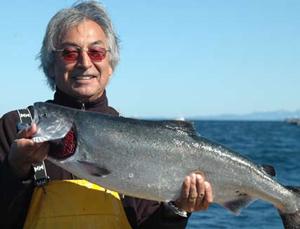
For most of the 68 years he’s lived, William L. Hensley, has called Alaska home. He’s from a group of people commonly known as Eskimos. However, his people call themselves Inupiaq, which means the Real People. Their relatives are the Yupik and a sub-group is the Chupik, all are referred to as Eskimos. Sometimes they are called Inuit. Hensley says they don’t mind that but it’s actually their word for “humans.” So essentially, we are all Inuit.
He grew up in a fairly traditional home near Kotzebue, located in northwest Alaska. They were 10 miles north by boat or dog sled from Kotzebue. His family lived off the land and the sea. The whales, walrus, seals, caribou, bear, moose, and berries provided for his family. “It was a hard life but a good life,” he says. ”If the game was scarce, there was hunger. When the game was plentiful, we were happy.”
“Our transportation was our own legs and dogs and sleds,” he recalls. Their word for sled is umiaq and was made from walrus or seal skins. He grew up speaking the language, which has deep guttural sounds. The word kayak comes from his language but they spell it qayaq, and pronounce the q with a guttural sound, deep in the throat. It’s not a hard K sound.
Yes, he lived in an iglu, that’s the correct way to spell the word. But it wasn’t made out of snow and ice. “This notion is such a persistent but erroneous image today. An iglu, yes is a home. (It) could be sod, as I lived in as a youth, or it could be log or it could be frame,” he says. Hensely says the snow house were temporary homes for a long dog team trip or a hunting trip.
He left home to attend college, first at the University of Alaska, and later graduated from George Washington University in D.C. with a bachelor’s degree in Political Science, and a minor in Economics. He entered into the world of politics, and served first as a state representative, and then a state senator. Hensley continued to affect the lives of all Alaskans, especially the Alaska Natives by serving in a number of state and regional positions including the Alyeska Pipeline Service Company. He also served as the Commissioner of Commerce and Economic Development and Chairman of the Land Claims Task Force, the latter being positions appointed by the governor. He also helped found the NANA Regional Corporation and served as its director for 20 years as well the Alaska Federation of Natives, where he served in a number of posts.
Higher education has helped him bridge the gap between Alaska Natives and non-Natives. “As minorities, we have to learn the language of the majority, its values, its religions, its economics, its politics, its idioms, its music, its jokes,” he says. “It doesn't work the other way around.” He says his education helped him become a communicator. “As a legislator, I tried hard to convey our peoples' point of view without getting totally sucked up in the system. I think other minorities will attest to the difficulty of being in a situation where the gears are constantly grinding.”
Retired now but still wishing to communicate, he wrote a book two years ago, "50 Miles From Tomorrow: A Memoir of Alaska and the Real People."
“There has been little in our generation that describes the wrenching changes that we have experienced, such as the arrival of the state in 1959, the effort it made to select 100 million acres of our land, our fight to get a land settlement. Nor, the challenges of setting up 175 village corporations and a dozen regional corporations, the effort to get high schools in our villages, and the children home from Indian boarding schools,” he says. The paperback version came out in March 2010. “It’s also in Korean,” he laughs.
Today things are very different. People mostly use snow machines to get around. Traditional whaling is now done under strict International guidelines, and all Alaskans are deeply dependent on oil.
“The big challenge is we’ve adjusted to a time of plenty because Alaska has been a wealthy state because of oil production. The big change is if we can adjust to less?” He says in 1988 two-million barrels of oil were drilled daily. It’s now down to 650,000 barrels of oil, and the production is declining about 5 percent each year.
He thinks, perhaps, his people will have to go back to what has sustained them for ages, the whales, the seals, the caribou, and the plants. “In the end, they are the very sources of survival we have depended on for 10 thousand years,” he says.
As for Hensley, his next effort is to leave a lasting legacy for his Inupiat (the plural of Inupiaq) people. “My dream is to have my memoir translated to Inupiaq,” he shares. It would be an audio book so folks could hear and learn or remember how to speak the language.
It’s his love of his people, the land, and the way of life that drives him. He urges folks to visit Alaska from May through August. “But if you want to really feel winter, come in December!” he advises.
For more information about William Hensley visit his website: www.williehensley.com
